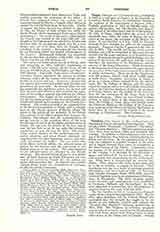

Tunkers (Ger. tunken, to dip), a Protestant sect thus named from its distinctive baptismal rite. They are also called “Dunkards”, “Dunkers”, “Brethren”, and “German Baptists“. This last appellation designates both their national origin and doctrinal relationship. In addition to their admission of the teaching of the Baptists, they hold the following distinctive beliefs and practices. In the administration of baptism the candidate is required to kneel in the water and is dipped forward three times, in recognition of the three Persons of the Trinity. Communion after the manner of the primitive church is administered in the evening; it is preceded by the love-feast or agape, and followed by the kiss of charity. On certain occasions they also perform the rite of foot-washing. Their dress is characterized by unusual simplicity. They refuse to take oaths, to bear arms, and, in so far as possible, to engage in lawsuits. Their foundation was due to a desire of restoring primitive Christianity, and dates back to 1708. In that year their founder Alexander Mack (1679-1735) received believers’ baptism with seven companions at Schwarz. enau, in Westphalia. The little company rapidly made converts, and congregations were established in Germany, Holland, and Switzerland. As they were subjected to persecution, they all emigrated to America between the years 1719 and 1729.
The first families settled at Germantown, Pennsylvania, where a church was organized in 1723. Shortly after some members, led by Conrad Beissel who contended that the seventh day ought to be observed as the Sabbath, seceded and formed the “Seventh Day Baptists” (German; membership in 1911, 250). The Tunkers, nevertheless, prospered and, in spite of set-backs caused by the Revolutionary and Civil Wars, spread from Pennsylvania to many other states of the Union, and to Canada. Foreign missionary work and the foundation of educational institutions were inaugurated in the decade 1870-1880. About the same time the demands for the adoption of a more progressive and liberal church policy became more and more insistent, and in 1881-82 led to division. Two extreme parties, “the Progressives” and the “Old Order Brethren”, separated from the main body, which henceforth was known as the “Conservative Tunkers”. These obey the annual conference as the central authority, and have a ministry composed of bishops or elders, ministers, and deacons. They maintain schools in various states, own a printing plant at Elgin, Illinois, and publish the “Gospel Messenger” as their official organ. (Membership, 3006 ministers, 880 churches, 100,000 communicants.) The Progressives hold that the decisions of the annual conference do not bind the individual conscience, that its regulations concerning plain attire need not be observed, and that each congregation shall independently administer its own affairs. (Statistics, 186 ministers, 219 churches, 18,607 communicants.) The Old Order Brethren are unalterably attached to the old practices; they are opposed to high schools, Sunday schools, and missionary activity; they have still, according to the long prevalent custom of the sect, an unsalaried ministry and are extremely plain in dress. (228 ministers; 75 churches; 4000 communicants.)
N. A. WEBER

